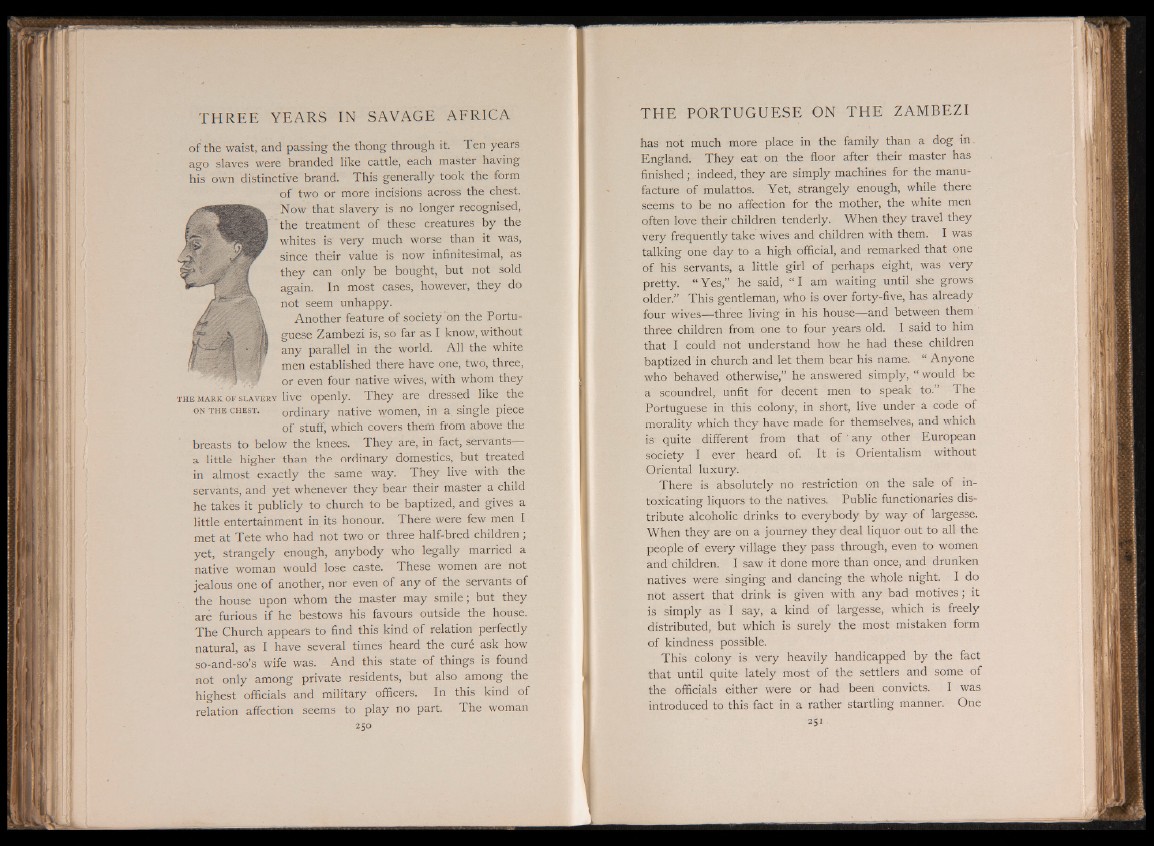
of the waist, and passing the thong through it. Ten years
ago slaves were branded like cattle, each master haying
his own distinctive brand. This generally took the form
of two or more incisions across the chest.
Now that slavery is no longer recognised,
the treatment of these creatures by the
whites is very much worse than it was,
since their value is now infinitesimal, as
they can only be bought, but not sold
again. In most cases, however, they do
not seem unhappy.
Another feature of society'on the Portuguese
Zambezi is, so far as I know, without
any parallel in the world. All the white
men established there have one, two, three,
or even four native wives, with whom they
t h e m a r k o f s l a v e r y live openly. They are dressed like the
o n t h e c h e s t . ordinary native women, in a. single piece
of stuff, which covers them from above the
breasts to below the knees. They are, in fact, servants
a little higher than the ordinary domestics, but treated
in almost exactly the same way. They live with the
servants, and yet whenever they bear their master a child
he takes it publicly to church to be baptized, and gives a
little entertainment in its honour. There were few men I
met at Tete who had not two or three half-bred children ;
yet, strangely enough, anybody who legally married a
native woman would lose caste. These women are not
jealous one of another, nor even of any of the servants of
the house upon whom the master may smile; but they
are furious if he bestows his favours outside the house.
The Church appears to find this kind of relation perfectly
natural, as I have several times heard the curé ask how
so-and-so’s wife was. And this state of things is found
not only among private residents, but also among the
highest officials and military officers. In this kind of
relation affection seems to play no part. The woman
250
has not much more place in the family than a dog in
England. They eat on the floor after their master has
finished; indeed, they are simply machines for the manufacture
of mulattos. Yet, strangely enough, while there
seems to be no affection for the mother, the white men
often love their children tenderly. When they travel they
very frequently take wives and children with them. I was
talking one day to a high official, and remarked that one
of his servants, a little girl of perhaps eight, was very
pretty. “ Yes,” he said, “ I am waiting until she grows
older.” This gentleman, who is over forty-five, has already
four wives—three living in his house—and between them
three children from one to four years old. I said to him
that I could not understand how he had these children
baptized in church and let them bear his name. “ Anyone
who behaved otherwise,” he answered simply, “ would be
a scoundrel, unfit for decent men to speak to. ’ The
Portuguese in this colony, in short, live under a code of
morality which they have made for themselves, and which
is quite different from that of f any other European
society I ever heard of. It is Orientalism without
Oriental luxury.
There is absolutely no restriction on the sale of intoxicating
liquors to the natives. Public functionaries distribute
alcoholic drinks to everybody by way of largesse.
When they are on a journey they deal liquor out to all the
people of every village they pass through, even to women
and children. I saw it done more than once, and drunken
natives were singing and dancing the whole night. I do
not assert that drink is given with any bad motives; it
is simply as I say, a kind of largesse, which is freely
distributed, but which is surely the most mistaken form
of kindness possible.
This colony is very heavily handicapped by the fact
that until quite lately most of the settlers and some of
the officials either were or had been convicts. I was
introduced to this fact in a rather startling manner. One
251